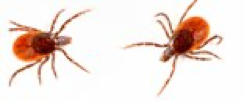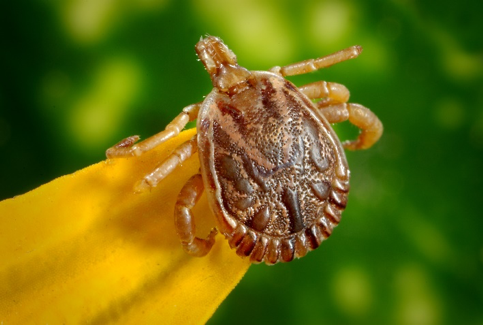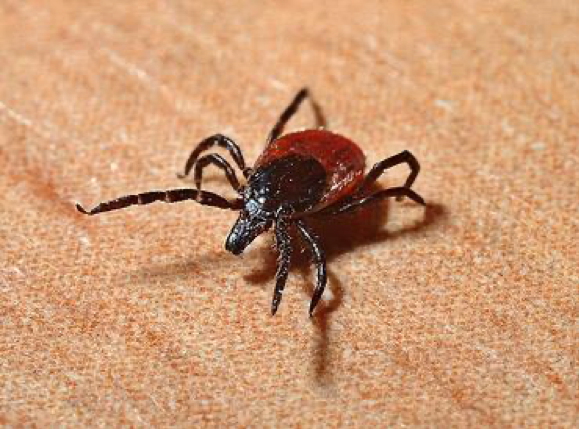
Ticks are parasites that will attach to a host (animal or human) for days at a time to feed on their blood. There are several types of tick that can be found in Florida, with the most abundant being deer ticks, American dog ticks, and lone star ticks. There are some variations between species and between developmental stages, but in general, ticks have 8 legs and can grow as large as 1/2 of an inch. While not all ticks feed on blood as adults, it is necessary for them to do so in order to reach the adult stage of their life cycle. They are most commonly found in forests and other areas of where the land is not maintained or manicured (though certain ticks can and will find their way into well cared for lawns). Almost all ticks in the Florida area are capable of spreading disease.
What do ticks look like?

Ticks do not have wings and they are flat and round. They are small until they feed and become plumper from the blood. Ticks are usually gray or white, but once they feed, they become a more reddish color. These pests also have sharp short legs that they use to help burrow into your skin. You won’t feel them when they land on you, so it’s difficult to identify them. Another issue that many people have with ticks is their speed. They move quickly, and they can jump far distances, so it’s nearly impossible to catch them. If you try to squeeze or squish them, you will think you succeeded until they bounce off your finger and onto something else.
There are a number of ticks that commonly found in Florida which include:
Deer Tick:
Deer Ticks are the primary tick responsible for the transmission of Lyme disease. These ticks do not travel far from their questing areas and are usually encountered during recreational activities in the woods of in meadows.
American Dog Tick:
American Dog Ticks are the most frequently encountered tick and are the most likely tick to be found on both pets and humans. These ticks are very active and will travel from their questioning locations into manicured areas. These ticks will readily use humans as a host and are capable of transmitting Rocky Mountain spotted fever.
Lone Star Tick:
Lone Star Ticks are very aggressive ticks and will actively travel from their questing locations into manicured areas. Lone Star Ticks are commonly found on a wide variety of animals, including humans. These ticks are capable of transmitting Lyme disease, Rocky Mountain spotted fever, Tularemia, and Erlichiosis.
Why do I have them?

You are most likely to encounter ticks when walking in an area that is naturally infested with ticks, like a forest or tall grass. While some ticks will venture out into even the best kept lawns, your chances of seeing ticks are increased if your property borders wooded areas, or if you walk in such areas frequently.
Are ticks dangerous?
Ticks are dangerous due to the horrible diseases they could carry. Here are some examples of what can happen from only one tick bite:
Lyme Disease – There are 30,000 cases of Lyme Disease reported yearly, and the condition is difficult to diagnose. Flu-like symptoms usually accompany it. The way most people identify a Lyme Disease carrying bite is through the bulls-eye appearance of the bitten area.
Rocky Mountain Spotted Fever – This bacterial disease is fatal and it causes fever, headache, nausea, vomiting, stomach pain and weight loss. RMSF is typically spread from the American Dog Tick and is most popular from Oklahoma to North Carolina and all the states in between.
Ehrlichiosis – We also have to worry about our furry friends. This condition affects humans, but it is most prevalent in dogs. It causes the death of white blood cells, which results in headache, fatigue, and soreness.
How can I prevent ticks?
You are most likely to encounter ticks when walking in an area that is naturally infested with ticks, like a forest or tall grass. While some ticks will venture out into even the best kept lawns, your chances of seeing ticks are increased if your property borders wooded areas, or if you walk in such areas frequently.
What is a Tick Termite and Pest Control in Tallahassee FL?
Serving Your Pest Needs for over 50 years in Tallahassee FL
